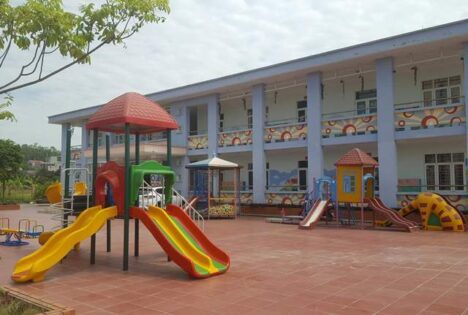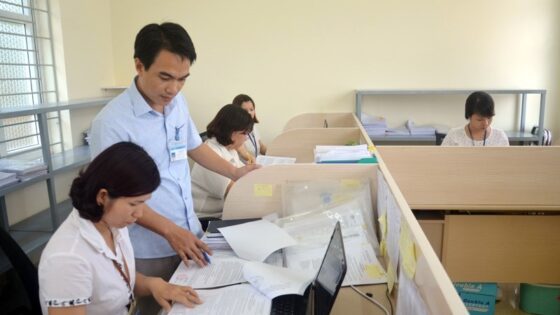Bộ 20 đề ôn thi công chức mầm non môn tiếng Anh 2020 – Phần 3

TEST 12 PAPER ONE: READING COMPREHENSION (60 phut) SECTION A:
In this section you must choose the word or phrase which best completes each sentence. Circle the letter A, B, C or D against the number of each item 1-20 for the word or phrase you choose
- She felt slightly uneasy as the porter unlocked the gates and waved her through
- a bit very C. greatly D. extremely
- She was shocked by the story
- upset confused C. impressed D. attracted
- I hadn’t got my swimming-costume with me
- bathing-suit dress C. sports coat D. raincoat
4…………………… are people between ages 13 and 19
- middle-aged people B. teenagers
- youngsters D. elderly people
- She is…………………. lower taxes. She thinks lower taxes are good
- in favor of against C. on side of D. fond of
- The man…………………. was away on holiday
- I want to see I want to see him C. I wanted to see D. I wanted to see him
- She is the one…………………. did it
- which that C. whom D. by whom
- The food was as good as people said…………….
- it is it were C. it would be D. it was
- He behaved………………… nothing had happened
- as as like C. like D. as if
- He doesn’t care how he stands. He stands…………….
- as he pleases if he likes C. as he can D. as he’s interested
- Do a good deed…………………. you can
- whenever in spite of C. though D. while
- He………………….. The basic course before he took the advanced one
- has taken would take C. had taken D. should take
- When will he begin to teach?…………………… he’s finished his training
- as soon as until C. how that D. so long as
- He suggested…………………. a double railway tunnel
- to build building C. build D. that building
- It would be possible to build a platform. A platform…………….
- could build must have been built
- could be built D. would build
- It was a great success. He succeeded………………… everyone
- to make in make C. for making D. in making
- He was sacked after having an argument with his
- hit fired C. scolded D. threatened
- I promptly went to sleep again.
- early soon C. immediately D. after a while
- Clara wanted to buy the coat, but it cost more than she could……………
- assume afford C. arouse D. adopt
- I sometimes take John’s coat instead of my own, because the two of them look so…………
- original similar C. comfortable D. the same
SECTION B
In this section you will find after the reading passage a number of questions or unfinished statements about the passage, each with four suggested answers or ways of finishing. You must choose the one which you think fits best.
The fact that most Americans live in urban areas does not mean that they reside in the center of large cities. In fact, more Americans live in the suburbs of large metropolitan areas than in the cities themselves.
The Bureau of Census regards any area with more than 2,500 people as an urban area, and does not consider boundaries of cities and suburbs. According to the Bureau, the political boundaries are less significant than the social and economic relationships and the transportation and communication systems that integrate a local. The term used by the Bureau for an integrated metropolis is an MSA, which stand for Metropolitan Statistical Area. In general, an MSA is any area that contains a city and its surrounding suburbs and has a total population of 50,000 or more.
At the present time, the Bureau reports more than 280 MSAs, which together account for 75 percent of the U.S. population. In addition, the Bureau recognizes 18 metropolises, that is, continuous adjacent metropolitan areas. One of the most obvious megapolises includes a chain of hundreds of cities and suburbs across ten states on the East Coast from Massachusetts to Virginia, including Boston, New York, and Washington D.C. In the Eastern Corridor, as it is called, a population of 45 million inhabitants is concentrated. Another megapolis that is growing rapidly is the California coast from San Francisco through Los Angeles to San Diego.
- Which of the following would be the best title for the passage?
- Metropolitan Statistical Areas Type of Population Centers
- The Bureau of Census D. Megapolises
- Where do most Americans live?
- In the center of cities In the suburbs surrounding large cities
- In rural areas D. In small towns
- Which of the following are not considered important in defining an urban area?
- Political boundaries Transportation networks
- Social relationships D. Economic systems
- According to the Bureau of Census, what is an MSA?
- The center of a city with a population of 50,000 people to the boundaries of the surrounding suburbs.
- A city and its suburbs with a total population of at least 50,000 people
- The surrounding suburbs of a city with a total population of 50,000 people
- Any area with a total population of 50,000
- Where in the passage does the author suggest that three-quarters of the U.S population now resides in MSAs?
- Lines 4 – 5 Lines 8 – 10
- Lines 11 – 12 D. Lines 16 – 17
PAPER TWO: USE OF ENGLISH SECTION A : PASSAGE FOR GAP-FILL
In this section you must find a word to complete the numbered blanks in the passage below. Use only ONE word for each blank.
Bill Jenkins worked in a big office in the city, and generally he ………………..(26) to go to the ………………..(27) during working hours to have his hair ………………..(28), although this was ………………..(29) the rules: Clerks ………………..(30) to have their hair cut in their own time.
While Bill ………………..(31) at the barber’s one day, the manager of the office came in by ………………..(32) to have his own ………………..(33) cut. Bill saw him and tried to ………………..(34) his face, but the manager came and sat ………………..(35) him, so he soon recognized him.
“Hullo, Jenkins,” the manager said. “I see that you are having your hair cut in office……………………… (36).”
“Yes, sir. I am,” admitted Bill calmly. “You see, sir, it grows in office time.”
“Not ………………..(37) of it,” said the manager of the office at……………………….. (38). “Some
of it grows in your………………………. (39) time.”
“Yes, sir, that’s quite true,” answered Bill politely, “but I’m not having it all……………………. (40) off.”
SECTION B : SENTENCE BUILDING
Make all changes and additions necessary to produce, from the following sets of words and phrases, sentences which together make a complete letter.
Dear Bill,
- I / expect / you / be surprise / get / letter / me
………………………………………………………………………………………………………………………
- As / can see / address above / I be / hospital
………………………………………………………………………………………………………………………
- Last Wednesday / I have / accident / when I drive / work
………………………………………………………………………………………………………………………
- Child / run out / front / my car / and I / have / stop / sudden / that / car behind / crash / me
………………………………………………………………………………………………………………………
- Luckily/ I wear / seatbelt / so I / not injure badly / although / have / stay / here / next Friday
………………………………………………………………………………………………………………………
- It be / very boring / I be pleased / see / if you / have / spare time
………………………………………………………………………………………………………………………
- Visiting hours / be / 7.00 to 9.00 / evening
………………………………………………………………………………………………………………………
- I hope / able / come
………………………………………………………………………………………………………………………
- Look forward / hear / you
………………………………………………………………………………………………………………………
- Give / regards / family
………………………………………………………………………………………………………………………
SECTION C : SENTENCE TRANSFORMATION
Finish each of the following sentences in such a way that it means exactly the same as the sentence printed before it
- Phillip asked Olive if she could remember where she had put the
Phillip said, “Olive………………………………………………………………………………………….
- It is a six-hour drive from London to
It takes……………………………………………………………………………………………………………
- Turn of all switches before leaving the
All the switches………………………………………………………………………………………………
- It is ages since Alan visited his parents. ………………………………………………………………………………………………………………
- Taylor does not like living in such a small houses.
Mrs. Taylor wishes………………………………………………………………………………………….
COMPOSITION
“What should we do to maintain good health?”
TEST 13 PAPER ONE: READING COMPREHENSION (60 phut) SECTION A:
In this section you must choose the word or phrase which best completes each sentence. Circle the letter A, B, C or D against the number of each item 1-20 for the word or phrase you choose
- I know I have seen that man before, but I can’t……………………..
- assume wonder C. recognize D. recall
- Every other house in the street has been demolished.
- exploded torn up C. removed D. torn down
- His hobby is collecting stamps from all over the
- pastime career C. business D. vocation
- How many idioms have we studied in this book so far?
- until the end of this book up to the present time
- by heart D. so carefully
- What’s wrong with your watch? It needs……………….
- repairing repair C. to repair D. a and b
- I’ll do the washing-up if my wife really wants me to but ……………….
- I’d rather she did I’d rather she does
- I’d rather she do D. I’d rather her did
- Near the White House is another landmark……………………… the Washington
- is which which called C. called D. it is called
- Because the first pair of pants did not fit properly he asked for……………..
- another pants others pants C. the others one D. another pair
- California relies heavily on income from fruit crops, and ……………
- Florida also Florida too C. Florida is as well D. so does Florida
- John said that no other car could go……………….
- so fast like his car as fast like his car
- as far like the car of him D. as fast as his car
- Let’s go dancing,……………………… ?
- shall we will we? C. Do D. let’s not
- If only he…………………….. so much last
- didn’t drink wouldn’t drink C. hadn’t drunk D. wouldn’t have drunk
- It’s important that every student…………………….. attentive in
- is are C. be D. were
- The floor in the room was so dirty as if it…………………….. for
- hadn’t swept hadn’t been swept
- haven’t been swept D. Wouldn’t have swept
- I remember……………………… him once in my
- to meet meeting C. to have meet D. met
16………………………. being late made the boss angry.
- him B. He’s C. his D. for him
- He was absent…………………….. his
- from in C. at D. to
- He did it in the way……………. I should have done it
- that as if C. as D. like
- There’s a lot of answers…………….. my
- for about C. with D. to
- I am very upset to hear about your accident.
- confused unhappy C. glad D. frightened
SECTION B
In this section you will find after the reading passage a number of questions or unfinished statements about the passage, each with four suggested answers or ways of finishing. You must choose the one which you think fits best.
Dear David,
Many thanks for your long and interesting letter. What a pity, though, that you had to write about what Jonathan has been up to in it. I must say it seemed to me quite unnecessary. I couldn’t of course let Amanda read it, though she kept asking for days. Rather thoughtless of you, dear, wasn’t it, because naturally the children are interested in your letters.
You didn’t tell me, by the way, that there was a bomb explosion in your office building shortly after you arrived, but I suppose you don’t want to worry us. Were you in any danger? If things get any worse you’ll have just to come home, and we’ll have to manage without all that money.
By the way, as you didn’t answer my question about the washing machine, I have bought a new one. Fully automatic and rather expensive but it’s super.
I heard about the bomb from Mr. Zapp. A very curious visit which I must tell you about. He cane round the other evening with the book you wanted. It was the most awkward time, about six just as we were about to have dinner, but I felt that I had to invite him in since he’d taken the trouble to bring your book round and he looked rather miserable standing in the wet snow outside the front door wearing waterproof boots and a funny fur hat. He didn’t need any persuading – practically knocked me over in his eagerness to get in the house. I took him into the front room for a quick drink, but it was like an iceberg – I don’t bother to light a fire in there now you’re away – so I had to take him into the dining room, where the children was just beginning to fight because they were hungry for their dinner. I asked him if he would mind me serving the children their meal while he finished his drink, hoping this give him the idea that he should leave promptly, but he said no, he didn’t mind and I should eat too, and he took off his hat and coat and sat down to watch us. And I mean watch us. His eyes followed every moment from dish to plate to mouth. It was very embarrassing. The children felt strangely silent, and I could see that Amanda and Robert were looking at each other and going red in the face with the effort of trying not to laugh. In the end I had to ask him if he wouldn’t like to join us for the meal.
Love, Rosemary
- Rosemary is writing this letter to David, who
- is coming home B. is working away from home
- does not think much about the children D. hasn’t written home recently
- What seems to be happening to David?
- He is in continual danger Someone is trying to kill home
- He is earning a lot of money D. He is involved in criminal activity
- What does Rosemary’s attitude towards David seem to be?
- She worries about him all the time
- She thinks more about money and the house than about him
- She lets him to do what he wants to do, and does not criticize
- She wants him to be involved in decisions about house and family
- Why does Rosemary describe Mr. Zapp’s visit as a curious one?
- She found Mr. Zapp’s behavior unusual and
- She was interesting in getting to know Mr. Zapp
- She had never met Mr. Zapp before
- Zapp was tense and unhappy.
- Why did the children go red in the face?
- They had been fighting They were having difficulty in not laughing
- They were making faces at each other D. It was too hot in the dining room.
PAPER TWO: USE OF ENGLISH SECTION A : PASSAGE FOR GAP-FILL
In this section you must find a word to complete the numbered blanks in the passage below. Use only ONE word for each blank.
Bodies are made to move! They are not designed for sitting around in front of the television or reading magazines. Keeping fit doesn’t ……………..(26) you have to be a super-athlete, and even a ……………..(27) exercise can give you a lot of fun. When you’re fit and healthy, you’ll find you look better and fell better. You’ll…….. (28) more energy and self-confidence.
Every time you move you……………..(29) exercising. The human body is designed to bend, stretch, run, jump and climb. The………… (30) it does, the stronger and fitter it will become. Best
of ……………..(31), exercise is fun. It’s ……………..(32) your body likes doing most – keeping on the move.
Physical exercise is not only good ……………..(33) your body. People who take regular exercise are usually happier, more relaxed and more alert……………..(34) people who sit around all day. Try an experiment – next time you’re……………… (35) a bad mood, go for a walk or play a ball
game in the park. See how…………………… (36) better you feel after an hour.
A sense of achievement is yet……………..(37) benefit of exercise. People feel good ……………..(38) themselves when they know they have improved……………..(39) fitness.
People who exercise regularly will……………..(40) you that they find they have more energy to enjoy life. So have a go – you’ll soon see and feel the benefits!
SECTION B : SENTENCE BUILDING
Make all changes and additions necessary to produce, from the following sets of words and phrases, sentences which together make a complete letter.
Dear Jane,
- Not seen you / long time
………………………………………………………………………………………………………………………
- We / pleased / move to country /, / fed up / London
………………………………………………………………………………………………………………………
- In city / traffic / noise / no time relax
………………………………………………………………………………………………………………………
- In country / life / slower / more / peaceful
………………………………………………………………………………………………………………………
- g. : / walk / with dog / across fields / before breakfast!
………………………………………………………………………………………………………………………
- Children / enjoy fresh air / make new friends
………………………………………………………………………………………………………………………
- People / helpful / kind / friendly
………………………………………………………………………………………………………………………
- But we miss / friend in London – especially you
………………………………………………………………………………………………………………………
- Come / see us soon
………………………………………………………………………………………………………………………
- We all / look forward / see you again
………………………………………………………………………………………………………………………
SECTION C : SENTENCE TRANSFORMATION
Finish each of the following sentences in such a way that it means exactly the same as the sentence printed before it.
- I couldn’t understand why he refused to come to my party. ………………………………………………………………………………………………………………..
- People often argue about things that are happening at the present. …………………………………………………………………………………………………………..
- He crossed the road without looking at both sides and was nearly knocked down. He ………………………………………………………………………………………………………….
- The flat is too small for all of us to live in. …………………………………………………………………………………………………………………..
- Drinking too much at his girlfriend’s birthday party, he found it difficult to drive As………………………………………………………………………………………………………………….
- The train couldn’t run because of the
The snow………………………………………………………………………………………………………………….
- I didn’t arrive in time to see her.
I wasn’t early……………………………………………………………………………………………………………
- I’m sorry I was rude to you yesterday.
I apologise………………………………………………………………………………………………………………..
- He didn’t hurry, so he missed the train. …………………………………………………………………………………………………………………………….
- Janet is the best tennis-player in the
No one……………………………………………………………………………………………………………………..
- It is impossible to learn a foreign language in a week. ………………………………………………………………………………………………………………….
- I like detective stories.
I am…………………………………………………………………………………………………………………………
- He is not here
I wish……………………………………………………………………………………………………………………….
TEST 14 PAPER ONE: READING COMPREHENSION (60 phut) SECTION A:
In this section you must choose the word or phrase which best completes each sentence. Circle the letter A, B, C or D against the number of each item 1-20 for the word or phrase you choose
- I’d like to………………………. that book when you’ve read
- borrow hire C. lend D. loan
- You forgot to put the milk in the fridge and it has ……………….
- gone back gone down C. gone off D. gone out
- The……………………… were delivered to the warehouse by
- data goods C. material D. stuff
- He’s a……………………… and so always votes for the Labour
- conservative liberal C. socialist D. socialite
- The diagram that shows the members of a family and their relation is called a family……………….
- tree branch C. line D. river
- Exams are never enjoyable,……………………… ?
- are they are there C. aren’t they D. aren’t there
- I’ve tried on this coat and it doesn’t………………………
- match suit C. fit D. wear
- Fruit and vegetables in a supermarket aren’t so fresh as at a……………….
- shop black market C. store D. greengrocer’s
- It’s unwise to buy new shoes and sandals without first……………………… them
- putting trying C. wearing D. keeping
- The magician ……………….asked for two volunteers from the ……………….
- watchers spectators C. audience D. listeners
- A TV show, film or play that makes you laugh is called a ……………….
- comedy fun C. joke D. humour
- It’s not going to rain all day. It’s just a……………………… and we’ll be able to go out
- drop shower C. drought D. drizzle
- In the early morning there may be thick……………………… and motorists should drive so
- fog rain C. shower D. mist
- Before you get in the car, put your luggage in the ……………….
- seats gear C. back D. boot
- We drove round the town centre for half an hour looking for a parking ……………….
- space area C. house D. stop
- The basement in some houses where things are stored is called a (n) ……………….
- attic cave C. cellar D. grave
- They fell in love at first ……………….
- glance sight C. look D. glimpse
- Our……………………… are always complaining about the noise we
- friends relatives C. neighbours D. classmates
- In our own garden, we can sunbathe on the……………………… in the
- field flowerbed C. meadow D. lawn
- Everyone can benefit……………………… a better road
- from in C. of D. at
SECTION B
In this section you will find after the reading passage a number of questions or unfinished statements about the passage, each with four suggested answers or ways of finishing. You must choose the one which you think fits best.
David Saucez’s bank robbing was as bad as his bingo. Desperate to pay off his gambling debts, he held up his local bank, and made off with around 2,000 pounds before turning up for work – as a member of Belgian gendarmerie.
It was the earliest arrest his colleagues could have possible expected. For Saucez not only use his service pistol in the hold-up, but also made his get-away in his own easily recognized family car. The car’s number was taken by the manager of the Sud Belge bank in the Brussels suburb of
Schaerbeek. He witnessed the hold-up, but was unnoticed by Saucez.
The unhappy gendarme told colleagues who arrested him that he had run up a debt of 60,000 Belgian francs (around 800 pounds), playing bingo. He was also paying off a home loan, and his wife – who works in another bank – did not know of his gambling.
Saucez, described as a “model gendarme” with six years’ service, said he considered robbing the same bank the week before. His nerve failed at the last moment, and he ended up asking for advice on a loan.
On Monday this week he returned to the same bank, and the same temptation. This time it was too much. He told arresting officers “I had no intention of committing a hold-up. I left the barracks to go to the bank and request a delay in repaying my loans. It was on the way there that I decided to take action.”
He was well equipped for the job, if not the getaway. Producing his service pistol, he demanded and got the money and then made off in his distinctive red Vauxhall.
The gendarmerie, having answered the manager’s alarm call too late to catch the robber red- handed, at least he had the information to catch him red-vehicle.
They traced the car number to Saucez, alerted his unit in Brussels, which said he had been on duty but was now absent. A few minutes later he turned up completely with the hold-up weapon, the getaway car, and the remainder of the loots in his pocket.
- David Saucez’s wife works
- as a policewoman as a security guard
- in the bank he robbed D. in another bank
- David Saucez’s wife….
- disapproved his gambling tried to help him to give up gambling
- was unaware that he was so heavily in debt D. was worried about his debt
- The previous week, David Saucez had planned to rob the bank but he…..
- asked them to lend him some money
- asked them what he should do about borrowing money
- paid some money into his account there
- didn’t care to go inside
- The police knew about the robbery because…
- David Saucez admitted his
- David Saucez had parked his car outside the bank
- David Saucez was unlucky
- the bank manager called them
- David Saucez arrived late for his duty because he….
- stopped to pay some of the money he owed was afraid to report for duty
- was going to rob the bank D. was trying to escape
SECTION B : SENTENCE BUILDING
Make all changes and additions necessary to produce, from the following sets of words and phrases, sentences which together make a complete letter.
6th July, 1989
Dear Bill,
- I write / cancel our meeting / tennis club / Wednesday 13th.
…………………………………………………………………………………………………………………………………….
- As you can see / this notepaper I be still /
…………………………………………………………………………………………………………………………………….
- I arrive / Monday 4th / expect / return / London / Thursday 7th
…………………………………………………………………………………………………………………………………….
- Things not go according / plan / I have / stay several more
…………………………………………………………………………………………………………………………………….
- I meet / Mr. Martinez / Tuesday 5th July / visit his factory / inspect / new
…………………………………………………………………………………………………………………………………….
- However, we not yet reach agreement / prices / delivery
…………………………………………………………………………………………………………………………………….
- The contract not sign yet / I must stay until it
…………………………………………………………………………………………………………………………………….
- Despite / difficulties I enjoy visit / Prado museum / eat / excellent restaurants
…………………………………………………………………………………………………………………………………….
- I phone you / I be back /
…………………………………………………………………………………………………………………………………….
- I / forward see / you soon.
…………………………………………………………………………………………………………………………………….
SECTION C : SENTENCE TRANSFORMATION
Finish each of the following sentences in such a way that it means exactly the same as the sentence printed before it
- I’m only interested in why he did
The only thing……………………………………………………………………………………………………………….
- The flat’s very noisy but we enjoyed living there. …………………………………………………………………………………………………………………………….
- We arrived too late to see the first
We didn’t………………………………………………………………………………………………………………………
- I’ll only help you if you promise to try harder. ………………………………………………………………………………………………………………………….
- “Don’t forget to phone the office,” she told
She reminded ………………………………………………………………………………………………………………..
COMPOSITION
- Write a letter to a friend whose wedding you have just attended. Say how much you enjoyed the service and reception, and what interested you most, and how you felt. Ask about the wedding photos and anything else you feel
- Describe a visit to an eccentric friend or
- Discuss the advantages and disadvantages of going package
TEST 15
SECTION A:
In this section you must choose the word or phrase which best completes each sentence. Circle the letter A, B, C or D against the number of each item 1-20 for the word or phrase you choose
- The man was staring at me furiously.
- angrily with surprise C. questioningly D. suspiciously
- I felt very relieved when he stood up and walked
- unhappy pleased C. frightened D. embarrassed
- The Brown had to use all their…………….. to buy their new
- expenses savings C. reserves D. leavings
- What are you cooking in that saucepan ? It……………..
- makes feels C. sniffs D. smells
- He was…………….. of all his
- stolen robbed C. removed D. taken
- I…………….. him to arrive in a
- expect wait C. hope D. suspect
- A plan was put forward by William He…………….. it.
- suggested intended C. aimed at D. planned
- The British feared invasion. They were…………….
- in favour of afraid of C. happy about D. ready for
- It was fortunate we didn’t have to carry him. It was our…………
- good chance good luck C. fortune D. fate
- He may eventually get across the channel. He may do this…………
- next after C. finally D. even
- He wanted to measure
- count make C. do D. take
- He has told us more than any…………….
- alive lively C. lifeless D. living
- The people in the theatre are the…………
- audience lookers C. observers D. watchers
- Programmes on TV and radio are…………
- broadcasts shows C. performances D. news
- Between two films there is a (n) …………
- connection link C. amusement D. interval
- If you live in a house ,which is not yours, you have to pay…………
- a fee rent C. a fare D. charge
- I never wear yellow because it doesn’t……………. me
- match harmonize C. like D. suit
- John and Lucky are very…………….. because their parents give them everything they ask
- overdone harmed C. damaged D. spoilt
- Can you……………. a pound ? I need some money for the telephone
- exchange change C. give D. offer
- It’s grandmother birthday tomorrow, so don’t forget to wish her many happy…………
- returns days C. anniversaries D. years
SECTION B
In this section you will find after the reading passage a number of questions or unfinished statements about the passage, each with four suggested answers or ways of finishing. You must choose the one which you think fits best.
What makes it rains? Rain falls from clouds for the same reason anything falls to Earth. The Earth’s gravity pulls it. But every cloud is made of water droplets or ice crystals. Why doesn’t rain or snow fall constantly from all clouds? The droplets or ice crystals in clouds are exceedingly small. The effect of gravity on them is minute. Air currents move and lift droplets so that the net downward displacement is zero, even though the droplets are in constant motion.
Droplets and ice crystals behave somewhat like dust in the air made visible in the shaft of sunlight. To the casual observer, dust seems to act in a totally random fashion, moving about chaotically without fixed direction. But in facts dust particals are much larger that water droplets and they finally fall. The average size of a cloud droplet is only 0.0004 inch in diameter. It is so small that it would take sixteen hours to fall half a mile in perfectly still air, and it doesn’t fall out of moving air at all. Only when the droplet grows to a diameter of 0.008 inch or larger can it fall from the cloud. The average raindrop contains a million times as much water as a tiny cloud droplet. The growth of a
cloud droplet to a size large enough to fall out is the cause of rain and other forms of precipitation. This important growth process is called “coalescence”.
- What is the main topic of the passage?
- The mechanics of rain The weather patterns of North America
- How Earth’s gravity affects agriculture D. Types of clouds
- Ice crystals do NOT immediately fall to Earth because
- they are kept aloft by air currents
- they combine with other chemicals in the atmosphere
- most of them evaporate
- their electrical charges draw them away from the Earth
- The word “random” in line 11 is closest in meaning to
- inpredictable perplexing C. independent D. abnormal
- What can be inferred about drops of water larger than 0.008 inch in diameter?
- They never occur
- They are not affected by the force of gravity
- In still air they would fall to Earth
- In moving air they fall at a speed of thirty-two miles per hour
- How much bigger is the raindrop than a cloud droplet?
- 200 times bigger 100,000 times bigger
- 1,000 times bigger D. 1,000,000 times bigger
SECTION B : SENTENCE BUILDING
Make all changes and additions necessary to produce, from the following sets of words and phrases, sentences which together make a complete letter.
Dear Sally,
- I / be / delighted / get / your letter this
………………………………………………………………………………………………………………………………..
- I / have / very clear / memory / Richard. He / seem / such / nice /
………………………………………………………………………………………………………………………………..
- I hope / you / be / happy together.
………………………………………………………………………………………………………………………………..
- Unfortunately / I / not be able / come /
………………………………………………………………………………………………………………………………..
- At my age / I not think / I find / journey /
………………………………………………………………………………………………………………………………..
- All / same / I love give you / wedding
………………………………………………………………………………………………………………………………..
- You / write / tell me / what / you / like / present ?
………………………………………………………………………………………………………………………………..
- My thoughts / be / with you both / the big
………………………………………………………………………………………………………………………………..
- Not forget / send / me / photographs / piece / wedding
………………………………………………………………………………………………………………………………..
- Look / hear /
………………………………………………………………………………………………………………………………..
SECTION C : SENTENCE TRANSFORMATION
Finish each of the following sentences in such a way that it means exactly the same as the sentence printed before it
- Somebody repaired her car yesterday. ………………………………………………………………………………………………………………………………
- You must see the manager tomorrow morning. You’ve…………………………………………………………………………………………………………………………
- I’ve warned you not to go near that
I’ve warned you about…………………………………………………………………………………………………..
- She can meet him if he arrives before eleven ………………………………………………………………………………………………………………………………..
- There was never any answer when he rang. ……………………………………………………………………………………………………………………………
- You are requested to walk on the pavement. …………………………………………………………………………………………………………………………..
- I was obliged to sell my house. ………………………………………………………………………………………………………………
- The pen is mightier than the sword
The sword……………………………………………………………………………………………………………………..
- No other animal is as big as an
The elephant………………………………………………………………………………………………………………….
- No other exercise is as healthy as swimming …………………………………………………………………………………………………………………….
- You must pay taxes or go to prison. ………………………………………………………………………………………………………………………….
- The work completely failed and everybody was
To everybody…………………………………………………………………………………………………………………
- The poor farmer was tired but he kept
In spite of ……………………………………………………………………………………………………………………..
- This is the sad news that you have brought. …………………………………………………………………………………………………………………………….
- She may be innocent. I don’t know
I do not………………………………………………………………………………………………………………………….
- The child will die if nobody sends a doctor. ………………………………………………………………………………………………………………………….
- He would prefer you to pay him
He’d rather…………………………………………………………………………………………………………………….
- The water was so cold that the children could not swim in
The water was not………………………………………………………………………………………………………….
- John smoked cigarettes when he was a young
John used ……………………………………………………………………………………………………………………..
TEST 16
SECTION A:
In this section you must choose the word or phrase which best completes each sentence. Circle the letter A, B, C or D against the number of each item 1-20 for the word or phrase you choose
- He failed to give……………. reasons for his absence from
- satisfactory suiting C. inadequate D. fit
- If she can make up such stories, she is certainly a very…………….
- imaginary imaginable C. imaginative D. imagining
- When I tried to walk I had a sharp……………. in my right
- hurt pain C. wound D. cut
- If you are impolite to a person, you should make an…………
- excuse apology C. invitation D. appeal
- My uncle went out of the house…………….
- an hour’s half a half of hour C. half an hour D. half hour
- He sent a copy of his will to his bank…………….
- for at C. in D. to
- Look each sentence over carefully and……………. the incorrect
- cross cross out C. cross through D. cross up
- You will have to cut……………. your living expenses a
- out down C. up D. off
- I must think that matter……………. carefully before I answer
- over on C. through D. about
- That woman certainly tried very hard to show……………. her new
- off on C. up D. over
- When I was looking through my papers, I came……………. this
- about around C. across D. at
- Should we go over the lesson now or put it……………. until late tonight ?
- off through C. on D. along
- There are some nice ties here. Why don’t you pick……………. one or two ?
- out on C. through D. along
- I tried to interrupt the two men, but they went…………….. arguing
- out on C. along D. off
- He said that he……………. all day on
- was working will be working C. will have worked D. might have worked
- The food was as good as people said…………
- it is it were C. it would be D. it was
- If only he……………. so much last night.
- didn’t drink wouldn’t drink C. hadn’t drunk D. wouldn’t have drunk
- It’s important that every student……………. attentive in
- is are C. be D. were
- Listen to what I am saying,……………… ?
- don’t you will you C. do you D. mind you
20……………… she plays the piano !
- How well B. How good C. What good D. How excellent
- I don’t want much sugar in my Just……………. , please.
- few B. little C. a little D. a few
SECTION B
In this section you will find after the reading passage a number of questions or unfinished statements about the passage, each with four suggested answers or ways of finishing. You must choose the one which you think fits best.
Marianne Moore (1887 – 1972) once said that her writing could be called poetry only because there was no other name for it. Indeed her poems appear to be extremely compressed essays that happen to be printed in jagged lines on the paper. Her subjects were varied: animals, laborers, artists, and the craft of poetry. From her general reading came quotations that she found striking or insightful. She included these in her poems, scrupulously enclosed in quotation marks, and sometimes identified in footnotes. Of this practice, she wrote, “Why are there many quotation marks? I’m asked…When a thing has been said so well that it could not be said better, why paraphrase it? Hence my writing is, if not a cabinet of fossils, a kind of collection of flies in amber.” Close observation and concentration on detail are the methods of her poetry.
Marianne Moore grew up in Kirkwood, Missouri, near St.Louis. After graduation from Bryn Mawr College in 1909, she taught commercial subjects at the Indian School in Carlisle, Pennsylvania. Later she became a librarian in New York city. During the 1920’s she was editor of The Dial, an important literary magazine of the period. She lived quietly all her life, mostly in Brooklyn, New York. She spent a lot of time at the Bronx Zoo, fascinated by animals. Her admiration of the Brooklyn Dodgers – before the team moved to Los Angeles – was widely known.
Her first book of poems was published in London in 1921 by a group of friend associated with the Imagist movement. From that time on her poetry has been read with interest by succeeding generations of poets and readers. In 1952 she was awarded the Pulitzer Prize for her Collected Poems. She wrote that she did not write poetry “for money or fame. To earn a living is needful, but it can be done in routine ways. One writer because one has a burning desire to objectify what it is indispensable to one’s happiness to express…”
- What is the passage mainly about?
- The influence of the Imagists on Marianne Moore
- Essayists and poets of the 1920’s
- The use of quotations in poetry
- Marianne Moore’s life and work
- According to the passage Moore wrote about all of the following except
- artists fossils C. animals D. workers
- The author mentions all of the following as jobs held by Moore except
- commercial artist teacher C. librarian D. magazine editor
- The word “succeeding” in line 27 is closest in meaning to
- inheriting diverse C. later D. prospering
- It can be inferred from the passage that Moore wrote because she
- wanted to win awards was dissatisfied with what others wrote
- feel a need to express herself D. wanted to raise money for the Bronx Zoo
PAPER TWO: USE OF ENGLISH SECTION A : PASSAGE FOR GAP-FILL
In this section you must find a word to complete the numbered blanks in the passage below. Use only ONE word for each blank.
In 1858, a French engineer, Aimeu Thomeu de Gamond,……………………….. (26) in England with
a plan for a twenty-one mile tunnel across the English Channel. He ………………..(27) that it would ………………..(28) possible to build a platform in the centre of the channel. This platform would ………………..(29) as a port and a railway station. The tunnel ………………..(30) be well- ventilated if tall chimneys were built above sea-level. In 1860, a better plan ………………..(31) put forward ………………..(32) an Englishman, William Low. He suggested that a double railway tunnel ………………..(33) be built. This would solve the problem ………………..(34) ventilation, for if a train entered this tunnel, it ………………..(35) draw in fresh air behind it. Forty-two years later a tunnel was actually begun. If, at the time, the British had not feared invasion, it would have ………………..(36) completed. Recently, there………………………. (37) again been great interest in
the idea of a Channel Tunnel. If it is built, it ………………..(38) connect Britain………………………………………………………………………………………………………………………………………………… (39)
Europe for the first time………………………. (40) history.
SECTION B : SENTENCE BUILDING
Make all changes and additions necessary to produce, from the following sets of words and phrases, sentences which together make a complete letter.
Dear Paul,
- At last / arrive / Paris / but / terrible trip.
………………………………………………………………………………………………………………………………………….
- Train / crowded / ferry / delay / two
………………………………………………………………………………………………………………………………………….
- When / finally set off / weather /
………………………………………………………………………………………………………………………………………….
- I / sick / all / time / arrive / feel / very weak
………………………………………………………………………………………………………………………………………….
- I decide / this / last time / I / travel /
………………………………………………………………………………………………………………………………………….
- Next time / I / book / seat / plane.
………………………………………………………………………………………………………………………………………….
- Although / journey / so bad / must say / I / enjoy / stay / you /
………………………………………………………………………………………………………………………………………….
- Remember / you / stay / me / any time / you / come / Paris
………………………………………………………………………………………………………………………………………….
- I / mean it / when / say / hope / that / be
………………………………………………………………………………………………………………………………………….
- Write / soon / let / know / when / you /
………………………………………………………………………………………………………………………………………….
SECTION C : SENTENCE TRANSFORMATION
Finish each of the following sentences in such a way that it means exactly the same as the sentence printed before it
- Jane is a brilliant swimmer. She represented Britain in the Olympic
Jane, a…………………………………………………………………………………………………………………………..
- The girl living next door to me is getting married next
The girl that…………………………………………………………………………………………………………………..
- This mountain is very high; we can’t climb
This mountain is too………………………………………………………………………………………………………
- Are you very tall? Can you reach that picture?
Are you tall……………………………………………………………………………………………………………………
- A donkey is less beautiful than a
A donkey is not……………………………………………………………………………………………………………..
- You do not have to pay for secondary education in
Secondary education………………………………………………………………………………………………………
- He had a weak heart which meant he couldn’t walk very
His heart……………………………………………………………………………………………………………………….
- I’m sorry that I didn’t finish my homework last
I wish……………………………………………………………………………………………………………………………
- She asked John how he liked her new dress. …………………………………………………………………………………………………………………………….
- A train leaves at eight o’clock every
There is………………………………………………………………………………………………………………………….
- Nobody can deny that she has a beautiful voice. …………………………………………………………………………………………………………………………………
- I would like you to help me to put the chairs
Do you mind…………………………………………………………………………………………………………………
- You may be strong, but you can’t lift this heavy box
No matter………………………………………………………………………………………………………………………
- Jane weighs as much as her
Jane is…………………………………………………………………………………………………………………………..
- They were building a new shopping center when we
A new shopping center…………………………………………………………………………………………………..
- Are they going to demolish these old houses?
Are these old houses………………………………………………………………………………………………………
- It was such bad coffee that he couldn’t drink it.
The coffee…………………………………………………………………………………………………………………….
- We passed an anxious
We passed an hour…………………………………………………………………………………………………………
- The teacher punished the boy for his
The boy was………………………………………………………………………………………………………………….
- Besides studying very well, he also works
He not only……………………………………………………………………………………………………………………










